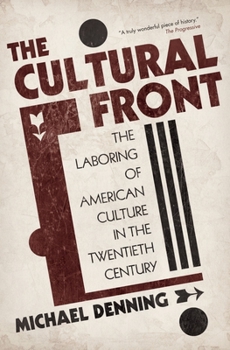The Cultural Front: The Laboring of American Culture in the Twentieth Century
Select Format
Select Condition 
Book Overview
The Cultural Front charts the extraordinary upsurge of cultural activity and theory in America that began during the Great Depression and embraced Disney animators and proletarian novelists alike, alongside Orson Welles, Duke Ellington, John Dos Passos, C. L. R James and Billie Holiday. Spawned by the Popular Front of the Communist Party, it grew to encompass virtually every aspect of high and popular art in the US, instigating one of the most culturally rich and exciting periods in American history.
Format:Paperback
Language:English
ISBN:1844674649
ISBN13:9781844674640
Release Date:January 2011
Publisher:Verso
Length:616 Pages
Weight:2.14 lbs.
Dimensions:1.7" x 6.0" x 9.1"
Customer Reviews
2 ratings
Excelente
Published by Thriftbooks.com User , 18 years ago
Un maravilloso libro que refiere lo que no sólo es una contextualización sociocultural de las luchas sociales, sino sobre todo "el otro frente", el que se dirime en las trincheras de la geografía cultural, de la mano de las luchas laborales. No es un mero contexto, sino una lucha en sentido propio, con tanta o más incidencia sobre las subjetividades que la lucha socio-laboral. A tal punto meritoria como centro de atención específico de la genealogía de un proceso de antagonismo social, que incluso sus propios protagonistas se erigen en genuinos héroes de la lucha por la emancipación y la autonomía, aunque hayan pasado a la posteridad -cuando tuvieron la fortuna de hacerlo- como meros "artistas". Mucho que aprender tenemos las generaciones actuales tanto de la articulación de luchas globales que atraviesan todo la fenomenología social, como de la absoluta trascendencia de ese "frente cultural".
Trenchant analysis of the leftist movement between the wars.
Published by Thriftbooks.com User , 25 years ago
Denning's examination of the leftist, socialist, proletarian, avant-garde,CIO amalgamation in the era between the wars is an extremely informative analysis of the labor-based reaction to post-World War I's economic, political and social,development. Derailing the myth that much of the movement was communist based or inspired, Denning instead argues that the uniting of a variety of movements in the arts, politics, intellectual circles, and mass media illustrated the country's increasing interest in redefining the American dream as it applied to the lower and middle classes. His trenchant analysis is bolstered by a hostof references and examples, unearthing mounds of literary, artistic, governmental and social works that--though forgotten today--were hallmarks of the era. Ultimately, Denning is able to explain how America's shift to the left eventually gave way to a dialectic shift back to the right after World War II as the country's interest in promoting business and mass production overrode its desire to bring civil and economic liberties to all. I have yet to read any book that as thoroughly and convincingly documents this time period's absorption with mass culture.





